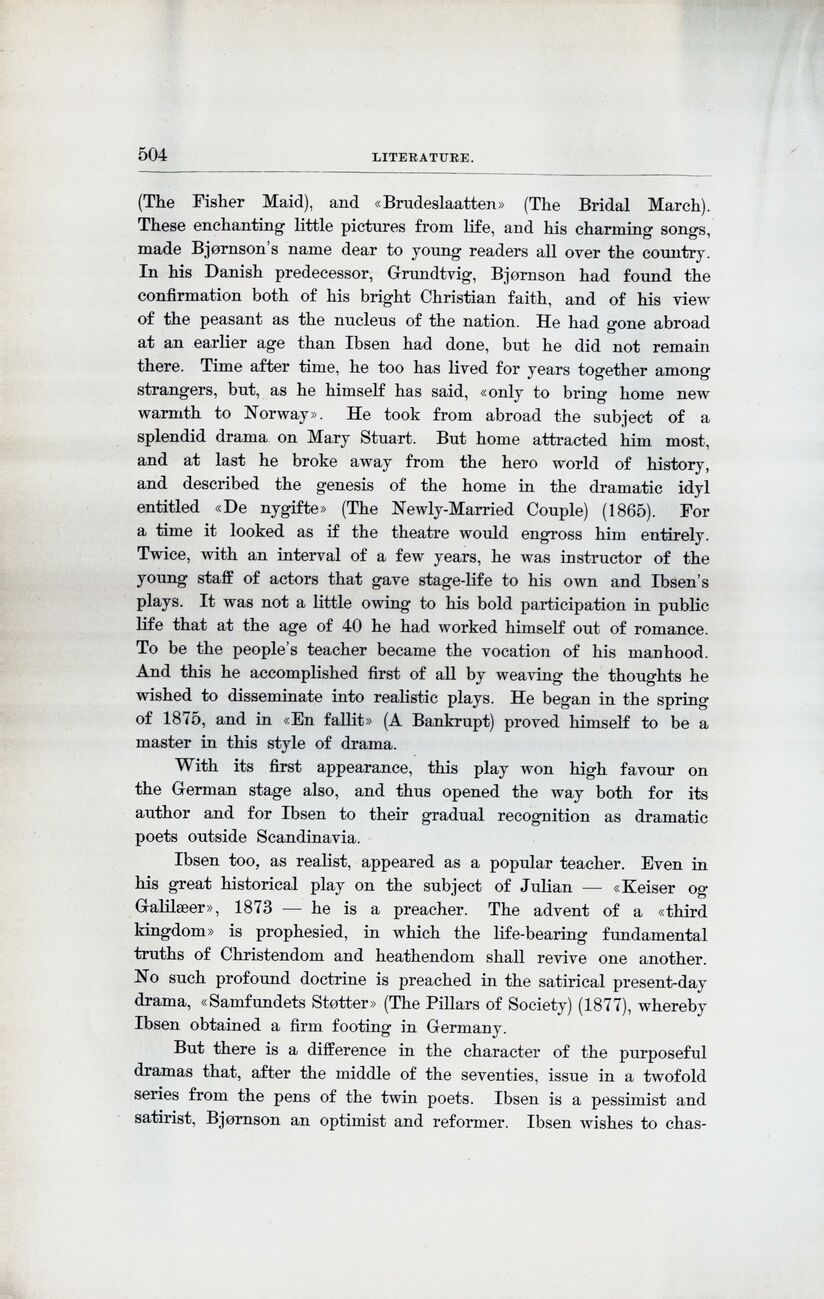
Full resolution (JPEG) - On this page / på denna sida - Literature, by Chr. Brinchmann

<< prev. page << föreg. sida << >> nästa sida >> next page >>
Below is the raw OCR text
from the above scanned image.
Do you see an error? Proofread the page now!
Här nedan syns maskintolkade texten från faksimilbilden ovan.
Ser du något fel? Korrekturläs sidan nu!
This page has been proofread at least once.
(diff)
(history)
Denna sida har korrekturlästs minst en gång.
(skillnad)
(historik)
(The Fisher Maid), aud «Brudeslaatten» (The Bridal March).
These enchanting little pictures from life, aud his charming songs,
made Bjørnson’s name dear to young readers all over the country.
In his Danish predecessor, Grundtvig, Bjørnson had found the
confirmation both of his bright Christian faith, and of his view
of the peasant as the nucleus of the nation. He had gone abroad
at an earlier age than Ibsen had done, but he did not remain
there. Time after time, he too has lived for years together among
strangers, but, as he himself has said, «only to bring home new
warmth to Norway». He took from abroad the subject of a
splendid drama on Mary Stuart, But home attracted him most,
and at last he broke away from the hero world of history,
and described the genesis of the home in the dramatic idyl
entitled «De nygifte» (The Newly-Married Couple) (1865). For
a time it looked as if the theatre would engross him entirely.
Twice, with an interval of a few years, he was instructor of the
young staff of actors that gave stage-life to his own and Ibsen’s
plays. It was not a little owing to his bold participation in public
life that at the age of 40 he had worked himself out of romance.
To be the people’s teacher became the vocation of his manhood.
And this he accomplished first of all by weaving the thoughts he
wished to disseminate into realistic plays. He began in the spring
of 1875, and in «En fallit» (A Bankrupt) [[** sic, ikke -cy]] proved himself to be a
master in this style of drama.
With its first appearance, this play won high favour on
the German stage also, and thus opened the way both for its
author and for Ibsen to their gradual recognition as dramatic
poets outside Scandinavia.
Ibsen too, as realist, appeared as a popular teacher. Even in
his great historical play on the subject of Julian — «Keiser og
Galilæer», 1873 — he is a preacher. The advent of a «third
kingdom» is prophesied, in which the life-bearing fundamental
truths of Christendom and heathendom shall revive one another.
No such profound doctrine is preached in the satirical present-day
drama, «Samfundets Støtter» (The Pillars of Society) (1877), whereby
Ibsen obtained a firm footing in Germany.
But there is a difference in the character of the purposeful
dramas that, after the middle of the seventies, issue in a twofold
series from the pens of the twin poets. Ibsen is a pessimist and
satirist, Bjørnson an optimist and reformer. Ibsen wishes to
<< prev. page << föreg. sida << >> nästa sida >> next page >>